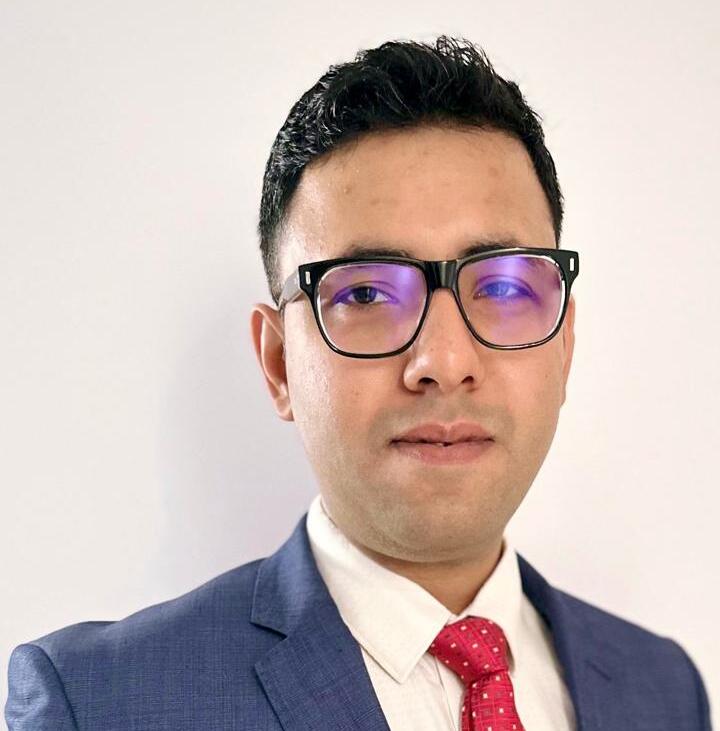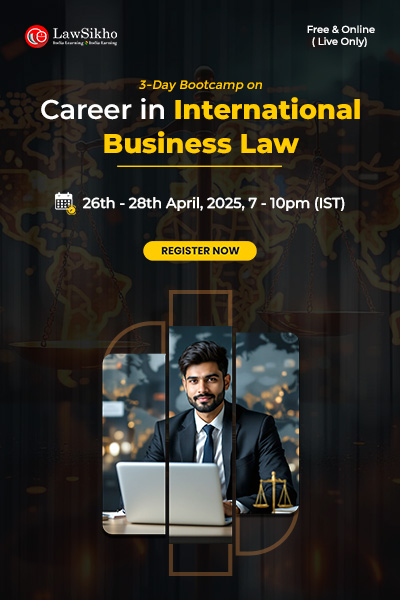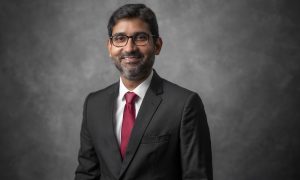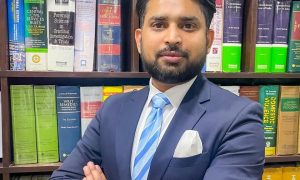This interview has been published by Anshi Mudgal and The SuperLawyer Team

Having built a successful legal career and currently being an AOR, what initially inspired you to pursue law? Was there a defining moment that confirmed your decision to embark on this profession? Additionally, how did your experience at Symbiosis Law School Pune contribute to shaping your legal journey?
Honestly, law was not my first choice. I initially wanted to join the army as I was into sports and athletics. However, nobody in my family has been in the forces and everyone I had or looked up to was a professional working in different areas. My parents are entrepreneurs and my elder brother had already chosen IT and Engineering sector, which was considered very rewarding then. I had the option of wanting to do something different and got all the support from my family. By class 12th I ended up eliminating the army option. I had narrowed down my choices to business administration or law. Back in 2011 law was still a lesser-known option for students and there was some novelty in the prospects of joining a law school. At that time, I was lucky because one of my cousins had joined RGNUL, Patiala in 2009, and I also got some very positive feedback from him regarding the subjects for the course. Few of my very good friends had also started their preparation for law entrance in class 11 and an interaction with them, and looking at the past law school entrance test papers interested me enough to sit for these exams. I ended up writing a couple of these exams and joined Symbiosis Law School, Pune, which was the best decision I ever made. Symbiosis played an instrumental role in shaping my journey. The kind of exposure I got there by interacting with people from different backgrounds, participating in moot court competitions and other extracurriculars really helped me grow both personally and professionally.
As you began your legal career, what were some of the key learning experiences that shaped your path? Starting as an Associate with a litigation office, what were the pivotal moments and challenges that were faced by you?
Despite my urge to sound positive and encouraging, I must admit that the initial years were quite tough. As a first-generation lawyer in a new city, everything felt overwhelming—getting nervous before every matter, second-guessing my drafts, worrying about whether my seniors would approve, etc. But I was lucky to have some great mentors who have been very supportive and have led by example to instill in me the values and importance of consistent hard work, developing an eye for detail and being clear in thought and words.
After transitioning to another firm and handling a variety of cases, including landmark Supreme Court cases for homebuyers, could you share your experiences from these cases? Specifically, what challenges did you face while representing homebuyers, and how did the judgment/order, particularly regarding the definition of homebuyers as ‘financial creditors’ under the Insolvency and Bankruptcy Code, affect their rights?
After working for almost a year at the office of a Senior Advocate, I moved to PSP Legal in 2017, where my legal career really picked up pace. At PSP we handled a lot of cases for aggrieved homebuyers across the NCR region. When I had joined in 2017, the prevalent option with the homebuyers was to go under the consumer protection regime. However, the process had its own limitations where although the homebuyers were successful in obtaining decisions in their favour, yet there were constraints in having them executed against the real estate entities. Needless to say, we faced tremendous opposition from the real estate players to refuse enforcement, often citing poor financial health of the sector as a whole.
We had also explored other legal remedies where criminal proceedings were also initiated on behalf of the homebuyers against a few promoters of the real estate entities for their criminal actions where all monies of the homebuyers had been siphoned off for their personal gain.
The laws around insolvency and its application to the real estate sector were still evolving at that time. However, we took charge and had initiated IBC proceedings against several established real estate players. Again, there was severe resistance against these actions, and the proceedings were dragged across several forums (NCLT, NCLAT, Delhi High Court and Supreme Court) in a relatively small amount of time, and we were fortunate to represent the homebuyer interests in all these proceedings.
The big breakthrough came when the Supreme Court confirmed that homebuyers are financial creditors under the IBC, in Pioneer Urban Land and Infrastructure Limited & Anr. v. Union of India &Ors. (2019). In this case we faced an initial setback as the Supreme Court had stayed all NCLT proceedings under IBC against the real estate builders initiated by the homebuyers. Finally, this judgment came as a big relief for the homebuyers and the homebuyers were confident in initiating similar proceedings across the country.
The whole journey (which is still ongoing), involving working non-stop in preparation for days, has been very rewarding. The cause of the homebuyers has become something very close to my heart, as some of our clients had put in their entire life savings and were left with nothing—not even legal clarity on how to fight back. To play a small part in their betterment, and in the development of the law was very satisfying. These cases also put a spotlight on PSP’s practice in this niche area of law.
With your extensive experience in both arbitration and real estate law, how do you foresee the future of these areas evolving, especially considering the continuous changes in regulations and legal developments?
In real estate law, there is still a lot of uncertainty especially with conflicting court rulings on similar issues. Whether it is RERA or the Consumer Protection Act, we also have to deal with situations where there are overlapping remedies under different legislations, and it becomes an important factor for advising on solutions to a particular legal problem. However, considering that the legal framework in the sector, especially under RERA, is still nascent, we are hopeful that critical issues (like construction of stalled projects, issues with banks disbursing loan amount directly to the builder without any due diligence and enforcement of the orders/directions) would be ironed out soon.
Arbitration has a lot of potential, but it is still expensive and not as efficient as it was designed to be. There is a lot of talk about India becoming a global arbitration hub, but we have got some ground to cover in terms of legal reforms and meeting the practical challenges.
Another big challenge is enforcement/execution of decisions, which is native to both real estate law and arbitration. Even after you win a case, enjoying the fruits of the decision can take years. The Supreme Court’s judgment in Periyammal (Dead) Through Lrs & Ors. v. V. Rajamani & Anr. Etc. (2025) is a step in the right direction as it has brought much needed reform and accountability in how lower courts/tribunals handle execution matters. However, how these directions are carried out into actions by the executing courts (especially in the face of shortage of judges and court staff, and judicial pendency) is something which we must look out for.
Becoming an AOR is a significant achievement. What motivated you to take the exam, and what steps did you take to prepare and succeed? How has becoming an AOR enriched your legal practice?
The AoR exam and the system of representation only through AoRs has a reputation of its own—and rightly so. I found the exam to be tough, mostly because you need to know the procedural aspects of law inside out, and it requires you to write longhand answers, which we are not used to any more after college.
What pushed me was the desire to have a separate identity at the Bar. As a first-generation lawyer, becoming an AoR felt like a major personal and professional milestone. Initially, as I was slowly getting familiar with the practice at the Supreme Court, I realized that being enrolled as an AoR would be a good value addition to my career and would give me a foothold towards perhaps setting up my own practice in the future.
The preparation for the AoR exam takes time so you must be consistent towards digesting the mandatory reading material, including study several landmark judgments which are part of the exam syllabus. However, I liked the process of preparation as it makes you pause and revisit several fundamental concepts, particularly for understanding procedural law and constitutional law principles, which are often missed out in the humdrum of day-to-day practice. It also helps in being updated with the recent developments in several topics of law.
Since qualifying, I have noticed a positive difference in how clients and colleagues perceive my work and me as a lawyer, which is very encouraging.
Can you discuss your experience of appearing and arguing before the Supreme Court in a case where the Court directed the CBI to place before it an action plan to probe the nexus between banks and real estate developers? What were the key legal challenges, and how does this ruling impact the protection of innocent homebuyers?
This litigation battle started during the pandemic in 2020, when homebuyers were facing a double-edged sword: while the builders were delaying the delivery of units on time, and the banks were also aggressively trying to recover against the home-loan amounts. The homebuyers were faced with a very peculiar situation that although the banks had disbursed more than 70% of the sanctioned loan amount directly to the real estate builders, and progress in construction of the projects was barely significant. This left the homebuyers in a situation where they do not have their homes (and often paying rent for their current accommodation) and also having to repay the EMIs of their home loans.
We first approached the Delhi High Court, which granted interim relief in early 2022 but ultimately, we lost the battle before the Delhi High Court. Later, the litigation reached the Supreme Court in 2023 after the High Court dismissed the petitions and the SC not only extended the protection but also rightly appreciated the issue and ordered the CBI to investigate the possible builder-bank nexus.
The biggest challenge was to highlight that this was not just a legal issue—it was a human one as thousands of families were suffering. Thankfully, the Court took a balanced view. It did not rush to conclusions but made it clear that if any wrongdoing is found, action would be taken against the builders and the concerned banks. For the homebuyers, this was a huge moment—they finally felt like their voices were actually heard.
With your diverse experience across various legal sectors and your practice at the Supreme Court, what advice would you give to aspiring lawyers who wish to specialize in these fields? What skills or personal traits do you believe are critical for success in the legal profession?
My biggest piece of advice would be that do not compare your journey with others. Everyone has their own pace, and there is no single “right” way to succeed in this profession. I believe that one must stay honest, work hard, and be patient. Also in the early years, try exploring different areas of law. That experience will help you figure out where your strengths and interests lie. Lastly, never stop learning—every case file, every court hearing and every client interaction teaches you something new and you should embrace it with open arms.
Throughout your distinguished career, how have you managed to maintain a healthy work-life balance? What advice would you offer to others trying to balance their professional goals with personal responsibilities?
Balancing work and life in this profession is tricky—it is easy to let work take over everything. For me, weekends and short breaks have been very important in unwinding—whether it is catching up with family, taking a short trip, or just disconnecting for a bit. Apart from all that, what keeps me motivated of late is maintaining a fit and healthy lifestyle, and now I have been an amateur long-distance runner for the past couple of years.
My advice to others would be that do not wait for a “perfect” time to take a break. Start small—an evening off, a Sunday without work, a mid-week chilling session with college friends—and build from there. Over time, it makes a big positive difference in your overall personality.
Get in touch with Akshay Srivastava –


























